Tactics, frameworks, and best practices abound on how to achieve global scale for tech startups. But what if the answer was simply to be in / start from Singapore? In this article, we survey various narratives of venture-backed startups validating pain points, product-market fit, and scaling globally and how they leveraged key features of Singapore’s continuously developing ecosystem to do this.
Highlights
- The question for startups that spring from pain points in Singapore is, how much bigger can the opportunity found in the city-state become on a regional or global scale? And how can the company navigate the replicability and scalability of its offerings to the nuances of shared pain points across markets?
- This journey of finding product-market fit and then scaling this PMF, be it through developing compound PMF or market expansion, does not exist in a vacuum. For a country like Singapore, where there are inherent market limitations for venture-backed startups to grow, the ecosystem has, by necessity, evolved to enable startups to (1) lay the foundations for global scale and (2) leverage a brand and ecosystem to actually execute on this global growth:
- Brand of Trust and Brand of Innovation strengthens commercial transactions and partnerships.
- Infrastructure to get from Zero to Global spurs deep tech startups.
- Shared economic environments, spaces for HQs, and supply open up trajectories for global expansion.
- Even in an increasingly borderless and flatter global digital economy, there will still be demand for offline, physical hubs, and the coagulation of (leadership/decision-maker) talent and capital in key geographic areas. It’s important for startups to know how to take advantage of the unique resources offered by the ecosystems of the markets they are in.
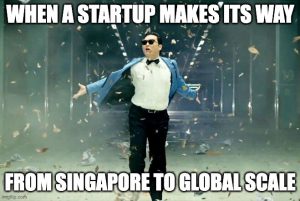
In 2019, femtech startup Ease Healthcare came about thanks to the personal experiences of founders Guadalupe Lazaro and Rio Hoe accessing sexual and reproductive health services in Singapore.
Guada illustrates the difficulties they faced on our podcast in 2021, and how it spoke to a larger, prevalent issue around education. “[Ease] was inspired very much by our own personal experiences with facing stigma or barriers when trying to access sexual and reproductive health services in Singapore, from uncomfortable encounters at the clinic including feeling judged or receiving unwanted advice to spending hours just queuing up for a birth control refill.”
“We noticed that there was a huge lack of awareness and discussion around sexual reproductive health in Singapore which does stem from the stigma surrounding these topics. So we wanted to provide a platform that’s so much more meaningful and where discussions and solutions can be attained.”
Rio expounds on the realization that they could actually leverage technology to solve these pain points at scale. “These experiences made us realize the significant barriers to accessing sexual and reproductive health services in Singapore and Asia that exist due to the prevailing cultural norms and existing infrastructure that still relies on face-to-face consultations. So people often don’t get the help they need due to the stigma, time, and cost involved. We realized that with technology, we can break down these barriers and revolutionize the ways in which we provide these services for people to access them much more conveniently and discreetly from the comfort of their homes.”
Around the same time, also in Singapore, Theodoric Chew was inspired to start what is now Asia’s leading mental health tech platform Intellect after going through the experience of accessing and maintaining mental health care services on his own.
Theodoric explains on our podcast in 2021 what he learned about the industry in Asia after diving deeper into the key pain points many like himself face when seeking mental healthcare, even in a developed market like Singapore.
“Three key things: one is the cost. It’s really expensive to seek help or get access to care and look for therapists, and psychologists. The second thing and probably the biggest issue is the stigma as you mentioned. I’ll expand on this a bit further. And if the third thing is actually, there’s quite a shortage in supply of practitioners, mental health practitioners across the region. Singapore actually has one of the lowest supplies in comparison to many other developed cities in the world.”
Then amidst the pandemic in 2020, as Vinita Choolani was looking for her next venture after scaling a leading women’s health biotech company globally over the past few years, she was able to zero-in on plant-based alternatives through Float Foods after seeing the country’s supply chains impacted.
As she shares on our podcast in 2022, “When I was toying around with some ideas in early 2020, and then pandemic struck, then I realized, “Oh my god, we are so vulnerable. We cannot get eggs and dairy and cheese.” None of it was available. I mean, now it’s two years later and it seems like a distant memory…But at that time, it was actually very palpable. You feel like you’re in a siege because you can’t have access to basic, everyday staples. And so that got me thinking and I said, “I’m a Singaporean. And I was born here. What can we do to change this?””
There are many more startup origin stories that stem from pain points unique or particular to Singapore, but oftentimes the question for these startups as they grow is, how much bigger can the opportunity found in the city-state become on a regional or global scale? And how can the company navigate the replicability and scalability of their offerings to the nuances of shared pain points across markets?
This journey of finding product-market fit and then scaling this PMF, be it through developing compound PMF or market expansion, does not exist in a vacuum with only the product and target customers in it. Various external factors like the funding environment, infrastructure accessibility, regulatory conditions, and socio-political relationships across borders play a role that cannot be understated for both founders and investors.
For a country like Singapore, where there are inherent market limitations for venture-backed startups to grow, the ecosystem has, by necessity, evolved to enable startups to (1) lay the foundations for global scale and (2) leverage a brand and ecosystem to actually execute on this global growth. From day one, Singapore founders already have to think global, and the country’s ecosystem also understood early on that there needed to be levers and moving parts to catalyze this level of growth.
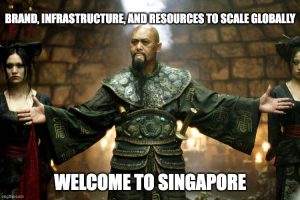
In this article we take a look at how Singapore as a country with its institutions and startup ecosystem has influenced the journeys of startups, in particular three aspects:
- Brand of Trust and Brand of Innovation strengthens commercial transactions and partnerships.
- Infrastructure to get from Zero to Global spurs deep tech startups.
- Shared economic environments, spaces for HQs, and supply open up trajectories for global expansion.
Brand of Trust and Brand of Innovation
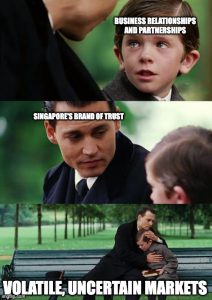
Leveraging the brand to maintain partnerships amidst uncertain conditions
One of the biggest assets a company gains from being headquartered or based in Singapore is its brand of trust when it comes to business, an important currency to driving acquisitions and retention especially for global and enterprise focused companies.
Smart access solutions platform igloocompany CEO and co-founder Anthony Chow shares on our podcast in 2021 how this has impacted their company’s global distribution growth, even amidst the strains of the pandemic.
“One of the important things that I feel that being a Singapore company is the amount of credibility in the brand that being based here gives you. Especially in this world during the pandemic where everyone’s working remotely, the most important currency in business is trust. And being able to honor contracts, documents that you put out there with your partners around the world and knowing that you will be good on your word, I think has been very important for us to do business, especially during this time.”
“So I think we’re quite proud to share that during the past 12 months, we have not lost a single partner around the world. And a lot of it has been the way we carry out our work, the reputation that we’ve built with our global partners and being a Singapore company definitely contributes a huge part to that as well.”
Creating win-win scenarios for economies through this brand of trust
And this “brand” can be a win-win as well for Singapore’s economy and economies that are involved in these business transactions or partnerships as well, as demonstrated in the case of B2B commerce platform Eezee’s partnership with PingAn-backed OneConnect to enable digital trade between Singapore and China SMEs, announced in 2020.
Logan Tan, CEO and co-founder of Eezee, shares on our podcast in 2020 how a partnership like this can build more bridges of trust between Singapore and China SMEs. “So our initial vision really was to help connect businesses within Singapore, and our ultimate vision is to connect them globally. And that’s why this partnership is really really important because what it does is that partners that we have which is OneConnect, backed by one of the largest insurers in China, called PingAn, and this is their technology firm right?”
“They already have a network of four million SMEs in China. By connecting these two platforms which are Eezee and OneConnect platforms together, we are enabling digital trade between two countries. And this is one of the first that Singapore and China have done.”
“What it benefits is being able to accelerate the entire process of trading. Previously there wasn’t really an intermediary to connect these two. If you want to buy certain things, either you make a physical trip down to China, to meet with the suppliers and then meet with the buyer to sell your catalog right? But now, everything is facilitated.”
“We have our network of sellers. They have a network of buyers. And then if we connect both of them together, they are able to transact seamlessly between the two countries. Cross-border trade has always been a major pain point of any business, whether it be you are buying or selling, because of trust.”
“By connecting both of these platforms together, we establish a bridge between the trust and to be able to connect the network that we have. This is one of the projects that has been very interesting for us, and it has always been our vision to help the local enterprise market overseas.”
Building the brand of innovation starts from within
Eezee has not only been able to leverage the brand of trust to link markets through digital platforms but also help build Singapore’s brand of innovation supporting institutional digitalization, as in the case of their partnership with the Singapore government (as announced in 2021).
Eezee CTO and co-founder Jasper Yap and then-Chief Commercial Officer, now COO Shawn Seet remark on the partnership on our podcast in 2021, in the context of more large organizations making moves to digitalize operations like procurement processes. “So typically it’s the largest organizations that will require the most time to change the processes. We’ve seen this in our work with SMEs, MNCs, and even the government.”
“Our recent partnership with the Singapore government will transform and set the bar for procurement for many years to come. In the future, physical forms and physical quotations will disappear. Our civil servants will no longer have to pay first and claim later, and everything will be seamless end to end from sourcing all the way to the payment. Eezee is honored that we get to lead this space with the Singapore government GovTech and the Ministry of Finance.”
Building the brand of innovation is a work-in-progress
Singapore’s brand of trust is tied to its brand of innovation, and this means regulations keeping a healthy pace with the on-the-ground innovation. Legaltech Intelllex, through their knowledge platform finreg.sg launched in December 2021, has been tapping into this dynamic by being a resource to help businesses in Singapore (or looking to domicile in Singapore) navigate the evolving regulation around cryptocurrencies and fund management.
As CEO and founder Chang Zi Qian shares on our podcast in 2021, “I think the numbers show…a lot more family offices and blockchain companies trying to relocate to Singapore and in the community…I was particularly inspired by the MD of MAS Ravi Menon’s speech at the recent Singapore FinTech Festival (2021). I think that the government has adopted a “Let’s go create and let’s not outright ban it” approach. Although I have no insight into when regulations can change, [recent developments] have expanded the definition of a virtual asset and virtual asset provider, an indication of it being wary of P2P may lead to regulatory change.”
“The difficulty in trying to define and categorize new innovation is something that nimble economies like Singapore and innovative economies like Singapore will embrace. So I think what particular takeaway I got from the Singapore FinTech festival was what Ben Horowitz said. He mentioned it will be a mistake to try and classify new innovation in the old world order. People think that blockchain technology can replace their credit card, then they may be sorely mistaken because it’s not going to be a replacement for something in the old world order, but it’s a new entire financial system. And I think what finreg.sg is trying to do here is to partner the community and try to make the exploration process a clearer one.”
Infrastructure to get from zero to global
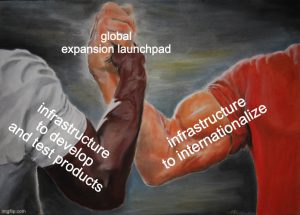
Infrastructure to get from zero to one
Brands of trust and innovation are not just intangible perceptions. These have evolved over time also by concerted efforts to build up the resources and networks to support the growth of companies at the frontier of innovation.
When it comes to the frontiers of alternative proteins and foods, Float Foods has been pushing the envelope with Asia’s first plant-based whole egg, OnlyEg, and getting that egg from incubation to commercial launch (just this Earth Day 2022) meant tapping into a lot of the infrastructure and resources Singapore had when it came to this area, as Vinita lists on our podcast.
“In Singapore, we’re very lucky. We’re very, very lucky. So I learned that when I was running my previous company before, we have an infrastructure that is unmatched. From the government side, we have EDB with ESG, and they have all sorts of incentives. From the research side, we have A-Star, right.”
“And we can also tap into academic institutions, from NUS to SUTD. So we have actually an amazing resource on our doorstep right here. And I think during INEX I realized, wow, I mean, this is a gold mine and we should be tapping into this to our advantage. So, what I learned from there also set the stage for when I set up Float Foods.”
“And I very quickly leveraged all these infrastructural support that we could get, whether funding or non-funding, whether it was expertise, whether it was R&D, whether it was infrastructure plug-and-play, moving into an all-ready lab, on all fronts. It was actually really, really easy and it allowed us to really focus on product.”
Among these various types of resources, one Vinita expands on in the podcast is the emergence of plug-and-play production setups in Singapore to support the specific needs of a foodtech startup.
“So I think the manufacturing gap is quite a big one because, startups like us, we don’t have easy access to [facilities] able to set up from scratch, [but] we’re in a position to let’s say plug-and-play, for example.”
“[But] access to ready manufacturing companies for plug-and-play is a bit limited, because the plant-based movement is quite different from the traditional manufacturing and traditional manufacturing in Singapore. At least from what we’ve experienced, it’s done in a particular way. So I think to try and switch it to a very different mindset is a little bit of a challenge.”
“So then the onus is back to us to set up our own facility, and with that comes costs and manpower; [there are a] different set of issues that come along with it. So it’s great because I know recently there has been a couple of plug-and-play set-ups that have opened up in Singapore.”
“We’ve gone to speak to them. So you walk in and they have 10 different kinds of equipment ready to rock and roll. So the question is for us to figure out how do we use this and how do we use that and how to do upstream and downstream and match the two so that it’s seamless [and] so it’s starting to take shape?”
Infrastructure to get from one to global
igloocompany CEO Anthony Chow dives on our podcast into two more examples of infrastructure support: networks for internationalization and accreditation for large-scale deployment, which have been key to their business given their global distribution and enterprise business iglooworks.
“The first one is Enterprise Singapore that supports many small, medium enterprises to upgrade and internationalize. We have been beneficiaries of many of the grants that they put up there for us to use. And specifically with internationalization, we have been tapping on their extensive network globally to be able to find distributors, go for trade shows, find potential clients all around the world, through the network that they have set up. And they were the ones that helped us springboard. In fact, our very first partner in the US was an introduction from Enterprise Singapore back in about four years ago.”
“The second one that has been very helpful for us is IMDA, which is the InfoComm Media Development Authority of Singapore. They help to regulate the InfoComm sector within Singapore. So IMDA has a program called the IMDA Green Lane Accreditation program, and it helps to create enterprise software products and innovative hardware solutions that have been developed by Singapore companies, that are ready for government deployment as well as large-scale enterprise deployment. And in fact, we went through the program. They assisted us in getting our backend solutions, our software and hardware certified for cybersecurity, and also certified the company ready for large-scale enterprise clients. And through that, we got the accreditation program. And from there, we also managed to get quite a number of potential clients within Singapore, and also beyond Singapore as well.”
While there is a diversity of options in terms of infrastructure support that startups are able to access in Singapore, both Float Foods and igloocompany cite some key specialties: (1) supporting deep tech startups in Asia get from zero to one (i.e. literal infrastructure, grants and funding), and (2) supporting internationalization (i.e. accreditations, global networks and partnerships), helping them to become “ambassadors” of Singapore’s brand of trust and innovation.
What Singapore has in common with…
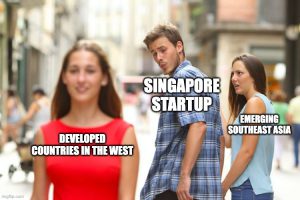
As we’ve mentioned at the beginning, the very nature of the market puts a lot of Singapore-founded startups in a position to already think and sell global from day one. And so we’ve seen throughout the piece how the ecosystem, through the market’s brands of trust and innovation, developing infrastructure, and global network of resources, has been catalyzing this jump from zero to global.
But Singapore (and ecosystems in general) does not only have an impact on how startups are able to catapult themselves into the global stratosphere, but also the direction they take, as it relates of course to the nature of their business.
Costs are thicker than water
And when it comes to the direction of global expansion, what is interesting to see is how Singapore, in asmuch as it has longstanding inefficiencies that perhaps harmonize better with the pain points that exist in Southeast Asia for example, adoption trends can be more closely related to more developed markets, given the costs of living, income levels, and the very infrastructure that enables these innovations to materialize.
igloocompany CEO and co-founder Anthony Chow explains on our podcast why they’ve been doubling down over the past year on the US and Europe as they’ve built their global distribution and enterprise partnership network, especially when it comes to commercial and utility use cases.
“It all comes down to one single factor and that is labor costs. Because when we’re trying to replace physical keys, the markets where they are the biggest pain point are markets where the labor cost is the highest. This really points to markets like the US and Europe and other developed markets around the world, such as North Asia, Australia, Singapore, et cetera. In fact, over in the US and Europe, we see a lot of applications that have started to use our products that we never thought they’ll be doing.”
“For example, in utility management, car sharing, and in Australia as well, tennis courts, when you want to book tennis courts, the tennis reservation can also go keyless with our Iglooworks solutions to allow you to book for an hour or two. Over in Europe, we’re seeing a lot of parcel drop off and pickups, companies that have started to work with us to enable them to have a much more seamless way of delivering packages to people.”
“Whereas if you’re looking at the developing markets, the push towards smart access for smart cities and smart homes is a trend that we’re seeing picking up, but we do believe that the time will take a bit longer because the pain might not be as strong. Over in Southeast Asia, we’re seeing successes more around the real estate property developer for smart homes.”
Templates and Shared Space for HQs
And even if the nature of the business necessitates hyperlocalization, as in the case of mental health, Singapore has proven to be both (1) testing and (2) hunting grounds for customer acquisition for fast-growing mental health tech platform Intellect.
CEO and founder Theodoric Chew emphasizes on our podcast the importance of catering to cultures and behaviors of specific markets in delivering their products or offerings at scale.
“And another key thing is that we invest a lot in personalization as well, right? Within the core app experience, a big part of mental wellbeing and therapies is really the nuance of the cultural context. So when we address a market and say Singaporean and a person in the US right, there are nuances that are quite different. What triggers each person is quite different and what they resonate with is also quite different. So how we personalize that piece is a key thing that we’ve spent a lot of time really developing a product to do. So that’s the first part on a high level at least.”
Then when it comes to securing MNCs for their enterprise business, Singapore also serves as a key hub for many to secure deals and run trials, being a common base of HQs for many MNCs in the Asia-Pacific region. Theodoric offers an example on our podcast.
“With Shopback, for example, one of the great clients that we have worked with very closely since, start of the year, we helped push this, not just to Singapore, but from a region-wide perspective. And it got taken up so well they had to expand [utilization] to different markets.”
Shared supply (of in-demand regulatory knowledge)
For Intelllex, in the same way that Intellect has replicated its hyperlocalization across markets in Asia, they aim to replicate what they’ve done with finreg.sg for markets where jurisdiction-specific financial services and fund management regulation knowledge is in high demand, like Hong Kong, Cayman Islands, or Dubai.
“We think that with the space, crypto and financial services evolving, it is not only a Singapore thing. Companies compare restrictions on where to put their money, where to set up their funds. People compare the regulations in Singapore, Cayman Islands…Hong Kong, Dubai, all the time. Startup companies do that as well. So we have [already] done our proprietary search algorithm…the second thing we are developing now is our proprietary questions taxonomy.”
“What would people ask? What are the related questions? And how are they organized? And apply that in another jurisdiction. And it would scale [as] we really figure it out. Singapore is a testbed. After we look at Singapore regulations, thereafter we can do Hong Kong very quickly, and then Cayman [Islands]. So when people ask one question, they actually know the legal position of let’s say, what is a stable coin? Singapore MAS says this, HK MAS says this…Cayman says this, really quickly. So that’s something we want to do. So finreg.sg is not only about SG. It’s really about the various prominent capital markets.”
Securing the floodgates of talent and capital
Core to all these advantages that startups coming out of Singapore are able to afford is the country’s ability to secure the floodgates of talent and capital that come to the region. We’ve seen various developments in both aspects over the past two years since the pandemic’s initial impact, as we wrote on initiatives to attract more senior tech talent and the influx of Chinese capital and family wealth into the city-state.
With areas like web3 where we see more web3 organizations out of the region preferring to domicile in Singapore (or their founders or key leadership live in or regularly travel to the city-state), and a continued draw for financial services, enterprise, and deep tech startups to base their key leadership and HQs in Singapore, we can expect more narratives like the ones we’ve shared today to emerge, both startups that sprout from local pain points and ones that finding adoption in entirely different markets but simply prefer being where all the dealmaking, networking, and cutting-edge activity is happening.
Even in an increasingly borderless and flatter global digital economy, there will still be demand for offline, physical hubs, and the coagulation of (leadership/decision-maker) talent and capital in key geographic areas. Rather than the eradication of these “Silicon Valley”-esque hubs, there will likely be a greater proliferation of them. It’s important for startups to know how to take advantage of the unique resources offered by the ecosystems of the markets they are in.
Other key cities and markets in Southeast Asia also have their own opportunities, and we’ve covered the Philippines, Indonesia, and Vietnam in recent months.
Paulo Joquiño is a writer and content producer for tech companies, and co-author of the book Navigating ASEANnovation. He is currently Editor of Insignia Business Review, the official publication of Insignia Ventures Partners, and senior content strategist for the venture capital firm, where he started right after graduation. As a university student, he took up multiple work opportunities in content and marketing for startups in Asia. These included interning as an associate at G3 Partners, a Seoul-based marketing agency for tech startups, running tech community engagements at coworking space and business community, ASPACE Philippines, and interning at workspace marketplace FlySpaces. He graduated with a BS Management Engineering at Ateneo de Manila University in 2019.